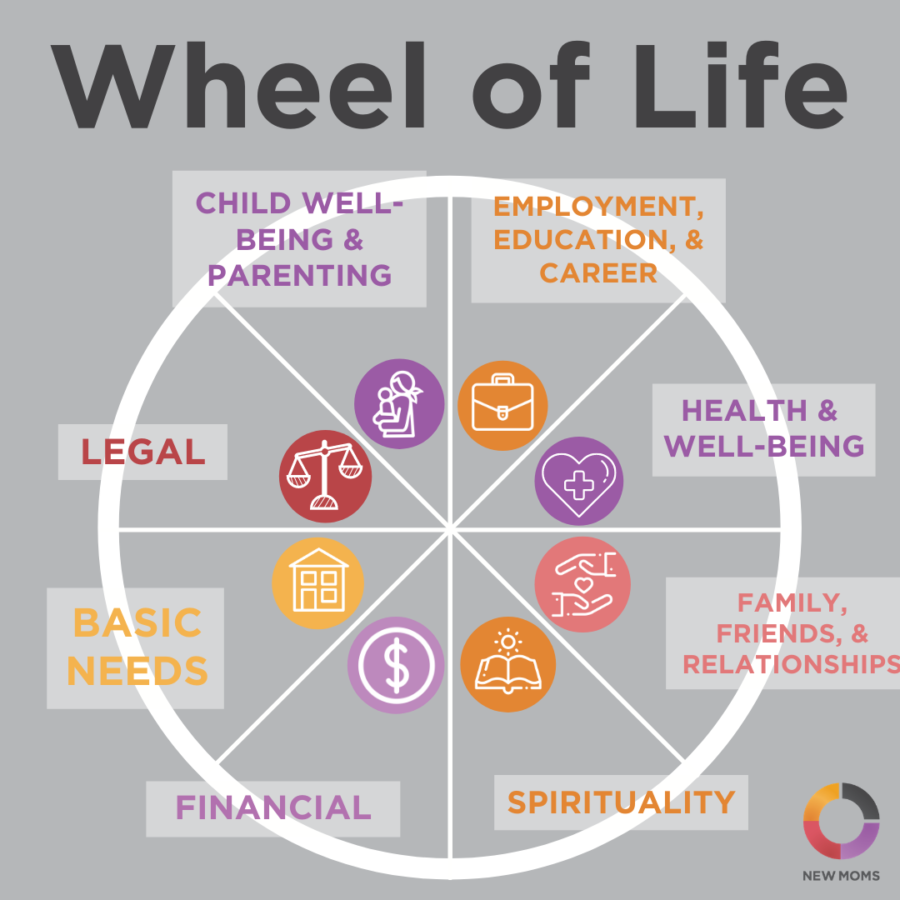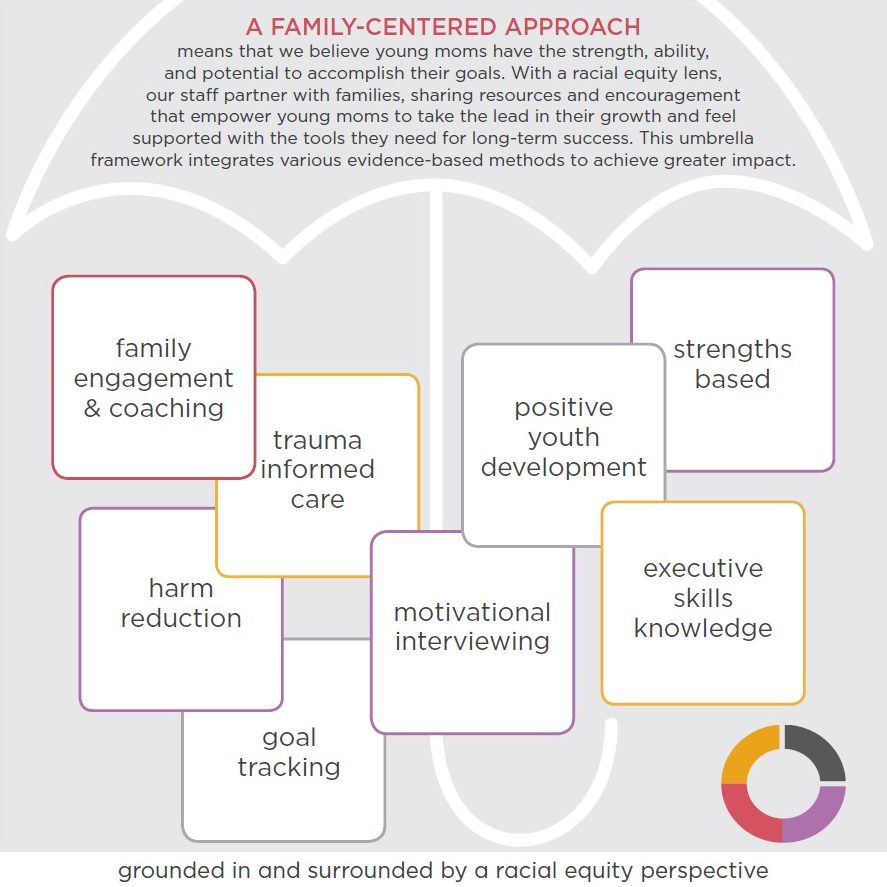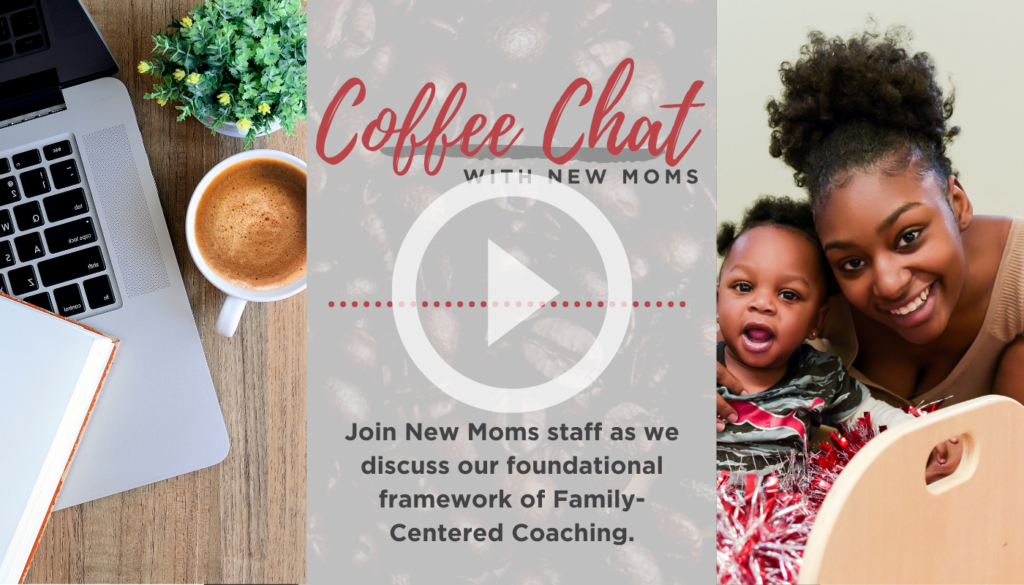What does coaching look like at New Moms?

At New Moms, we partner with young moms, 24 and under, as they take powerful first steps towards thriving futures. A large part of this work is done through one-on-one coaching. Moms in all three of our programs – Housing, Job Training, and Family Support – are paired with a New Moms coach. Our coaches are allies of resilient families, supporting program participants with tools and resources they need as they navigate parenthood, adolescence, and achieve their goals.
Want to know what this looks like in practice? In this Q&A, New Moms CEO, Laura Zumdahl; Chief Program Officer, Melanie Garrett; and Family Support Specialist, Andrea Serna take a behind-the-scenes look at New Moms’ Family-Centered Coaching (FCC) approach. They’ll explain what FCC is and why New Moms uses this rather than traditional case management to best support our moms.
The interview was adapted from our latest Coffee Chat and has been lightly edited. You can view the full recording here.

Laura Zumdahl: Today we’re here to chat about what coaching looks like at New Moms, and more specifically how our Family-Centered Coaching approach impacts young moms and their children. So let’s dive in!
Melanie, can you tell us what the Family-Centered Coaching approach is?
Melanie Garrett: Sure Laura! Family-Centered Coaching is really a mindset and a process that offers a set of strategies and tools that help human service organizations like New Moms better engage with families to achieve their goals. I want to be clear that we did not create Family-Centered Coaching. It was developed with support from the W. K. Kellogg Foundation, by a group of community organizations, parents and other experts in the field in response to the growing understanding that traditional case management wasn’t working.
Our goal at New Moms is to empower young moms to lead their families into thriving futures – but using a traditional case management model puts the power in the hands of the provider rather than the participant. So a few years ago, we adapted and implemented the Family-Centered Coaching, or FCC, approach into our work. It’s really shifted our focus on the innate strengths and skills of young moms and to harness these abilities to help set their families up for long-term success. And as you will hear today, at its heart, FCC is a strength-based way to fully engage with families.
Laura: Thank you Melanie for that overview. Andrea, as a coach who works directly with families, could you explain what this looks like in practice? What are the biggest differences between a traditional case-management approach and the Family-Centered Coaching approach?
Andrea Serna: I would say the biggest difference is the end goal you’re working towards. When a young mom comes to her coach with a problem, is the goal just to solve this immediate problem or is it to build up the mom’s ability to solve this and future problems? Traditional case management wants to solve the current problem by telling the mom what to do – giving her a check-list. This isn’t a collaborative or empowering process. The Family-Centered approach on the other hand, seeks to support the mom as she finds a solution to the problem herself.
As Melanie said, at New Moms we want to set families up for long-term success, so rather than just telling them what to do, coaches like me support families as they set and pursue personalized goals. We call this “putting the family in the driver’s seat.”
Laura: Thank you Andrea for clarifying that for us. I want to focus for a moment on the idea of “putting participants in the driver’s seat.” As a coach, what are some of the ways you intentionally center families in your work?
Andrea: It all starts with asking powerful questions like “How can I support you?” “What’s on your mind?” “What’s causing you stress?” “What would you like to work on?” etc. When I have home visits with participants, I ask them to tell me what it is they would like to focus on.

When it comes to goal setting at New Moms, we also have a tool called the Wheel of Life that we use to help participants determine their goals. Moms fill out a questionnaire which asks them to rate their satisfaction in all eight areas of the wheel. I’ve found this to be a powerful visual tool for helping moms see where they might want to start first.
So after filling out the questionnaire, a mom might realize that she wants to focus first on her financial situation. And with this direction, I can help her set a SMART goal in that area, for example saving 10% of her paycheck for a down payment on a new car over the next three months. I facilitate this exercise, but the entire process is led by the mom.
Laura: Thanks Andrea for sharing your process with us and giving us a behind-the-scenes look at coaching at New Moms. Could you share an example of how this went with one of your participants?
Andrea: Sure! One of my participants was hearing a lot of ideas about how to parent her new baby from her family and friends like “don’t hold your baby too long, you’ll spoil her” and she was getting overwhelmed. One of the areas on the Wheel of Life is “Parenting & Child Development,” so we focused on this and worked together to learn about child development and positive parenting techniques. This helped her create her own ideas and make her own decisions about parenting. It was also important for me to hold her as the expert on her child, and value her knowledge. It was really exciting to see her find her voice and figure out the type of parent she wanted to be!
Then when she had a bad experience with an employer, I was able to point to this previous accomplishment and encourage her to pull from those same strengths to address it. She’s truly learning how to advocate for herself in all types of difficult situations!
Laura: I love this story! What a great example of how our coaches support the moms we serve as they pursue thriving futures. Thank you for sharing.
I want to zoom out a bit and talk about some of the specific strategies and tools that make up Family-Centered Coaching. Melanie, could you elaborate on this?

Melanie: Absolutely. There are eight evidence-based approaches under our FCC umbrella, and we could spend all day talking about each one but for the sake of time, we will focus on three – Executive Skill Knowledge, Trauma-Informed Care, and Goal Tracking. But if anyone is interested in learning more about the others they can find more information on our website.
Let’s start with one of my favorites – Executive Skills. Earlier we mentioned that Family-Centered Coaching is a strengths-based approach, and Executive Skills knowledge is one way we’re able to identify and cultivate these strengths. Everyone has Executive Skills – they are the 12 brain-based abilities that govern how we organize things, how we react to things and how we get things done. Coaches help moms identify their strengths and struggles which not only increases their self-awareness, but also helps both coaches and moms better tap into strengths and find ways to mitigate the struggles with weaker executive skills.
Andrea, would you say that’s an accurate description?
Andrea: Yes, the Executive Skills framework has been great for our participants, especially because it gives coaches and moms a shared language. For example, I had a participant who really looked at herself and realized she struggled to keep her commitments. She was floating between jobs, not sure if she wanted to work at a daycare or develop her own business. Because we use the Executive Skills framework, we were able to connect this to one of her self-identified struggles – “Goal Directed Persistence.” Being able to name this struggle helped us understand it, and we worked together to find ways to lean into her own strengths to mitigate it!
Melanie: Thanks Andrea, that is a great example of using this approach!
Another component of FCC that is critical at New Moms is Trauma-Informed Care. This framework acknowledges that trauma might be a part of anyone’s story, and that we can acknowledge that those experiences might still be affecting them today. It shifts the focus from “What’s wrong with you?” to “What happened to you?” And, we look for opportunities to build resilience through positive and trusting relationships like those Andrea forms with her participants.
Andrea: Yeah, acknowledging the past experiences of participants is a crucial part of coaching. It can be really powerful to ask moms questions like “Where do your parenting ideas come from?” to help them connect with their own upbringings. Moms may share about growing up in a variety of stressful or abusive situations, which impacts all areas of their life as adults. By helping them reflect on how they were raised, they can be more intentional about their own parenting.
Recently, I was talking about nutrition with a participant more specifically about what and how toddlers are expected to eat. We talked about how forcing a child to eat everything on their plate can have negative consequences in the future. This mom responded by saying, “Now that we’re talking about it, I had that experience when I was little and now I feel guilty when I don’t eat everything on my plate or I eat when I’m upset.” She made that direct connection with her own past experience which led to a constructive conversation about how she wanted to raise her own children differently.

Melanie: Exactly! Thanks so much for sharing that Andrea. We also apply an understanding of the effects of trauma by adjusting the physical environment, program design, and coaching interactions – like the example Andrea just outlined – at New Moms to reduce the potential for re-traumatization. Again, we recognize everyone may have experienced trauma so coaches work to establish safety, trust, voice, and choice with families.
Okay and lastly, let’s talk about Goal Tracking. As I’m sure you’ve noticed, goals are an important topic at New Moms. Andrea already shared some of the ways she helps moms set goals, but what’s equally as important is how we think about goal attainment.
Participants set their goals and coaches support them by…
- Understanding their Executive Skills and how they may result in behaviors
- Removing barriers to goal achievement by modifying the environment including adapting the space, process, tools, materials, etcetera
- Asking powerful questions
- Setting and Tracking SMART Goals
- Nudging goal progression and
- rewarding goal achievement with rewards/incentives
Coaches help participants craft a quarterly milestone plan which outlines their SMART goals. SMART is an acronym that many of you might be familiar with and we use it when moms are creating goals. It stands for: specific, measurable, achievable, realistic, and time-bound.
This milestone plan provides a structure so participants have a plan they develop and coaches can support moms and help hold them accountable to the goals they set. Andrea, is there anything I missed?
Andrea: I don’t think so Melanie. I would just add that these tools are useful when we check in with moms because the goals are written out step-by-step. I can ask “How did this specific step go? Did you encounter any challenges?” or “What can we celebrate this week?” Even if the larger goal isn’t complete, we still have something to talk about and this incremental progress is powerful.
Laura: Andrea, could you share a story of a mom who was able to accomplish her goals?
Andrea: For sure. I’m thinking of a mom who has been partnered with us for the last two years. Before getting involved with New Moms, she was in an emergency shelter with a 2-month-old baby. Her family kicked her out of the house after they found out she was nine months pregnant. Over the last two years, she has accomplished so much. She’s now a full-time assistant manager, she’s reconnected with her sister, she just got her own market rate apartment, she’s in therapy, and her 2-year-old son is receiving early intervention support as well.
The consistency of regular home visits allowed me to build trust and rapport with her. We created a space to focus on the things she wanted. She told me that having someone to encourage and celebrate her accomplishments helped her continue forward with her goals. She was so motivated that she has even done presentations about youth experiencing homelessness and services for youth for policy makers and The Night Ministry, which is another Chicago-based human services organization. She’s a real inspiration!
Laura: Incredible! That’s exactly what we want for all moms who partner with New Moms.
Thank you to both Andrea and Melanie for sharing Family-Centered Coaching with us and explaining why New Moms uses this approach when working with young moms.